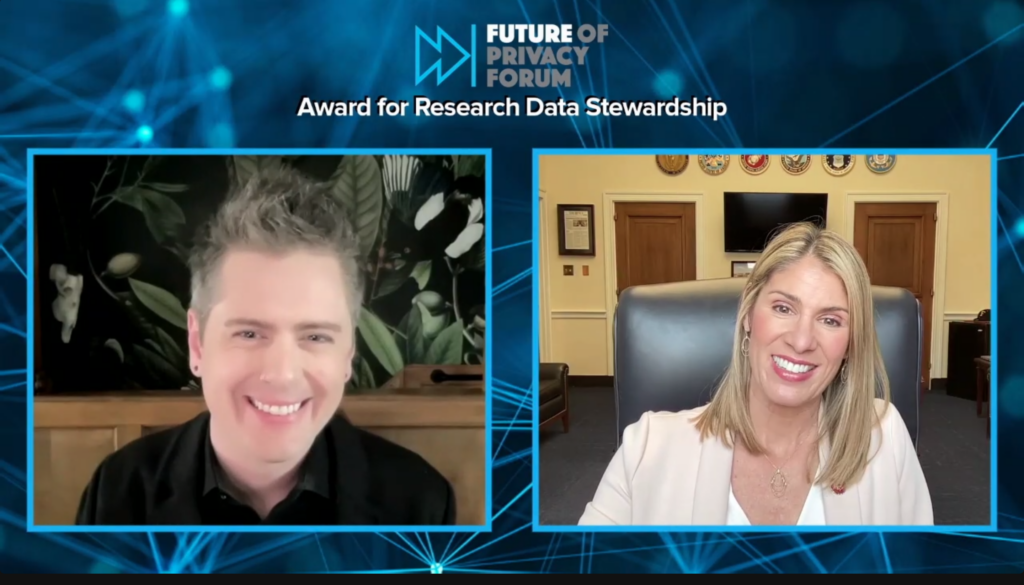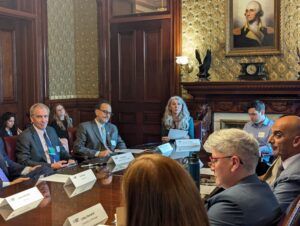Optum & The Mayo Clinic Win the 2022 Award for Research Data Stewardship
Author: Randy Cantz, U.S. Policy Intern, Ethics and Data in Research and former Communications Intern at FPF
On Wednesday, May 10, 2023, the Future of Privacy Forum (FPF) honored representatives from Optum and the Mayo Clinic for their outstanding corporate-academic research data-sharing partnership at the 3rd annual Awards for Research Data Stewardship. The awards honor companies and researchers that prioritize privacy-oriented and ethical data sharing for research.
In a keynote address, United States Congresswoman Lori Trahan applauded the winning partnerships for their ongoing commitment to responsible data sharing. “Ensuring that independent researchers can take a look under the hood of companies is essential to holding big tech executives accountable to the promises they make to their users,” Trahan said. “That’s why the work that you all do is so important, proving that this can be done in a responsible way on both the researcher and company sides.”

SHARING HEALTH DATA WHILE PROTECTING PRIVACY
Dr. Mehwish Qasim provided an overview of the award-winning research partnership. She emphasized that any collaboration that utilizes data from Optum must follow strict guidelines, and there are careful protections to ensure the appropriate use of data.
“This collaboration enabled important research that led to a broader public benefit and impact on diabetes management,” said Dr. Qasim, emphasizing the importance of accessible private data. She added this was possible because of the variety of data and rigorous and standardized data cleaning, validation, and comprehensive safeguards.
LEVERAGING HEALTH DATA FOR RESEARCH
Dr. Rozalina McCoy introduced her research team’s study, explaining that their research was helping to understand how different communities receive different advice for diabetes-related incidents and how best to improve patient care at all stages of a person’s life.
“One out of every seven adults has been touched by diabetes in some way, and one out of every four healthcare dollars in the US is spent caring for people with diabetes,” said Dr. McCoy, describing the importance of diabetes research. In response to an audience question, Dr. McCoy recommended that researchers understand the benefits and risks of research data from the beginning and establish a clear data-sharing policy that has safeguards in place.
KEY QUESTIONS & ANSWERS
Audience members posed their most pressing questions to the winning team about the inherent challenges in data sharing for research. Below are some of the main takeaways.
What are some of the tensions between access to data and the limitations that may have been part of the research considerations?
Dr. McCoy: Optum has very strict privacy controls; they have the data, but they can’t give it to researchers all at once. We have to be strategic about what our specific questions are and what combination of variables we can look at to still answer our questions, but maintain patient privacy. We’re able to do a lot for privacy, for example, making sure that all the data linkages are done by someone besides the researcher to ensure that privacy is protected. This way, we can maintain privacy, objectivity, and rigor.
What are your thoughts on how we encourage more organizations to do this type of data sharing?
Dr. Qasim: From a corporate perspective, there are a couple of things that I would advise or look for in terms of best practices. The first is to understand the benefits and risks. Have a clear data-sharing policy that outlines what can be shared and what safeguards are in place to establish those data-sharing agreements. Of paramount importance are the data security requirements and privacy protections.
Do you see trade-offs that have to be made, given some of the challenges of ensuring that datasets are de-identified?
Dr. Qasim: There are legal requirements and ethical considerations that are critical, including controls that balance encryption and secure data storage. These comprehensive safeguards are the kinds of factors that would help me evaluate the utility of the research while maintaining the protection and privacy of the individuals.
FINAL THOUGHTS
Jules Polonetsky, CEO at FPF, communicated FPF’s appreciation for the research of the award runners-up, Gravy Analytics and the University of Florida, which is a public land-grant institution and an emerging Hispanic-Serving Institution. Polonetsky emphasized that FPF is eager to promote responsible data-sharing practices.
“This is hard, grinding work. Kudos to the team,” Jules said. “It’s not something that a broad range of companies are able to do without real and significant expert partnership and collaboration. The end goal is to advance science and the broader social good.”
For more information on privacy-oriented and ethical data sharing for research, see The Playbook: Data Sharing for Research or join the Ethics and Data in Research Working Group.



